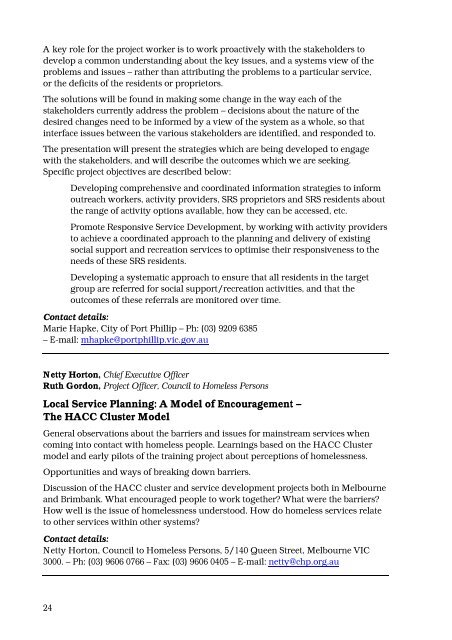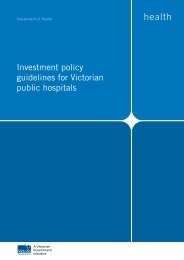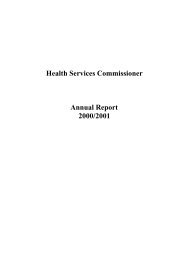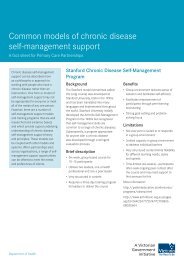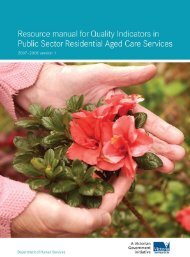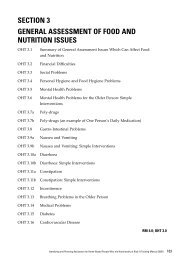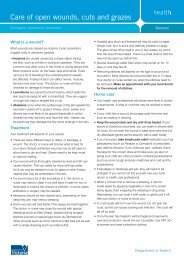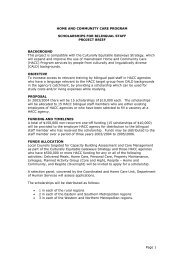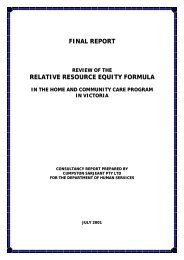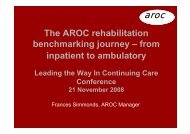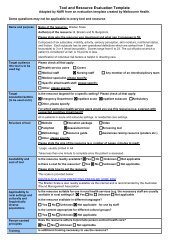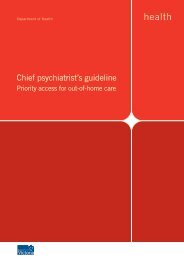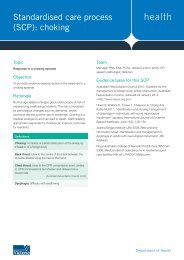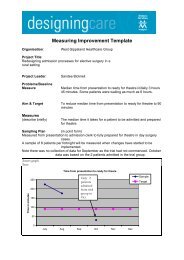Abstracts & Presentation Summaries - Department of Health
Abstracts & Presentation Summaries - Department of Health
Abstracts & Presentation Summaries - Department of Health
You also want an ePaper? Increase the reach of your titles
YUMPU automatically turns print PDFs into web optimized ePapers that Google loves.
A key role for the project worker is to work proactively with the stakeholders to<br />
develop a common understanding about the key issues, and a systems view <strong>of</strong> the<br />
problems and issues – rather than attributing the problems to a particular service,<br />
or the deficits <strong>of</strong> the residents or proprietors.<br />
The solutions will be found in making some change in the way each <strong>of</strong> the<br />
stakeholders currently address the problem – decisions about the nature <strong>of</strong> the<br />
desired changes need to be informed by a view <strong>of</strong> the system as a whole, so that<br />
interface issues between the various stakeholders are identified, and responded to.<br />
The presentation will present the strategies which are being developed to engage<br />
with the stakeholders, and will describe the outcomes which we are seeking.<br />
Specific project objectives are described below:<br />
<br />
<br />
<br />
Developing comprehensive and coordinated information strategies to inform<br />
outreach workers, activity providers, SRS proprietors and SRS residents about<br />
the range <strong>of</strong> activity options available, how they can be accessed, etc.<br />
Promote Responsive Service Development, by working with activity providers<br />
to achieve a coordinated approach to the planning and delivery <strong>of</strong> existing<br />
social support and recreation services to optimise their responsiveness to the<br />
needs <strong>of</strong> these SRS residents.<br />
Developing a systematic approach to ensure that all residents in the target<br />
group are referred for social support/recreation activities, and that the<br />
outcomes <strong>of</strong> these referrals are monitored over time.<br />
Contact details:<br />
Marie Hapke, City <strong>of</strong> Port Phillip – Ph: (03) 9209 6385<br />
– E-mail: mhapke@portphillip.vic.gov.au<br />
Netty Horton, Chief Executive Officer<br />
Ruth Gordon, Project Officer, Council to Homeless Persons<br />
Local Service Planning: A Model <strong>of</strong> Encouragement –<br />
The HACC Cluster Model<br />
General observations about the barriers and issues for mainstream services when<br />
coming into contact with homeless people. Learnings based on the HACC Cluster<br />
model and early pilots <strong>of</strong> the training project about perceptions <strong>of</strong> homelessness.<br />
Opportunities and ways <strong>of</strong> breaking down barriers.<br />
Discussion <strong>of</strong> the HACC cluster and service development projects both in Melbourne<br />
and Brimbank. What encouraged people to work together? What were the barriers?<br />
How well is the issue <strong>of</strong> homelessness understood. How do homeless services relate<br />
to other services within other systems?<br />
Contact details:<br />
Netty Horton, Council to Homeless Persons, 5/140 Queen Street, Melbourne VIC<br />
3000. – Ph: (03) 9606 0766 – Fax: (03) 9606 0405 – E-mail: netty@chp.org.au<br />
24


